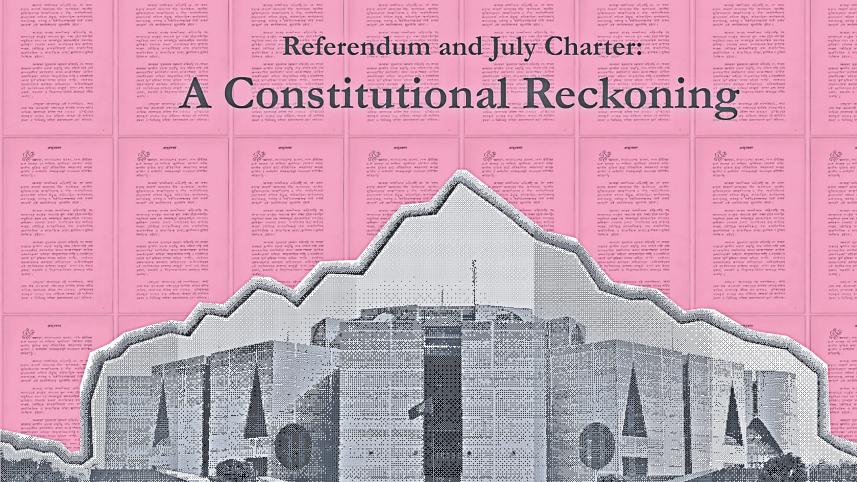Referendum and July Charter: A constitutional reckoning for Bangladesh

In the crucible of Bangladesh's political evolution, the July National Charter 2025 has emerged as a transformative document- one that seeks to fundamentally recalibrate the nation's democratic architecture. With eighty-four reform proposals, half requiring constitutional amendments, the Charter has ignited a national debate about the very mechanisms of popular sovereignty. Central to this discourse is the vital question: should Bangladesh hold a referendum to ratify these monumental changes? The argument that a referendum is both legally feasible and constitutionally desirable offers a rare, momentous opportunity to re-anchor the state's legitimacy in the direct will of the people, invoking the foundational principles of constitutionalism and democratic theory.
The July Charter proposes reforms (electoral reforms, redefining checks on executive power, introducing safeguards against parliamentary overreach etc.) that are not merely statutory tweaks, but implicate entrenched provisions of the Constitution. Under Article 142 of the Constitution of Bangladesh, constitutional amendments require a two-thirds majority in Parliament. However, the current political climate- marked by deep fragmentation and persistent democratic deficits- makes such a consensus elusive and politically insufficient. In a polarised democracy, an amendment passed solely by a supermajority risks being perceived as partisan, thus failing to achieve necessary political legitimacy. A referendum, therefore, becomes a pragmatic and principled alternative, enabling direct democratic endorsement and effectively immunising the reforms from future partisan challenges.
A principal critique is that the Constitution of Bangladesh does not explicitly provide for referenda. Yet, critically, it does not prohibit them either. This silence is a space for constitutional imagination. Legal scholars distinguish between constitutional silence and constitutional prohibition. The normative foundation for a referendum lies in Article 7(1) of the Constitution, which unequivocally declares that '[all] powers in the Republic belongs to the people…'. If sovereignty resides in the people, a mechanism that directly engages them on supreme law is necessarily an operationalisation of that sovereignty. Furthermore, the Preamble and Article 11 enshrine democracy as a fundamental ideal of the Constitution and a fundamental principle of state policy respectively. A referendum being a quintessential tool of direct democracy perfectly aligns with this principle. It operationalises the idea that citizens are not mere subjects of the law but co-authors of the constitutional order.
Referenda offer a crucial bridge between representative institutions and direct participation, especially in moments of constitutional renewal. The July Charter being a constitutional manifesto responding to a sustained national demand for fundamental reform, ratifying it solely through parliamentary procedure risks deepening the democratic deficit. A referendum, by contrast, re-legitimises the state structure through broad, participatory consent. Moreover, the other formal legal pathways- via presidential ordinance or parliamentary legislation- are currently unavailable due to the dissolution of Parliament and the extra-constitutional nature of the interim authority itself. This inability elevates the question to one of foundational constitutional theory.
The July Uprising in 2024 created a Kelsenian constitutional rupture. A new legal order was established, validated by the revolution's success and popular consent. However, the path for the interim authority remains constrained by the Supreme Court's ruling in Monzur Ahmed Bhuiya v Adilur Rahman Khan (2011), which explicitly curtailed the application of the doctrine of necessity in constitutional issues. Therefore, the interim authority cannot rely on the 'doctrine of necessity', rather issue a proclamation or a foundational law that derives its force directly from the sovereign will of the people which validated the July revolution. The referendum itself then serves as the crucial bridge: the formal, explicit process by which the people sanction the specific reforms of the July Charter, legitimising the new constitutional order.
Critics argue that referenda can be manipulated or oversimplify complex issues. While these concerns are valid, they are not fatal. With robust procedural safeguards- including independent oversight, transparent question-framing, and extensive civic education- a referendum can be a deliberative exercise. The ballot must present clear, segmented questions, allowing voters to express nuanced, informed preferences. Crucially, the referendum must be framed not as a plebiscite on government performance, but as a sacred constitutional moment. The focus must be squarely on the principles of reform.
The debate over timing- whether the referendum should precede or coincide with the national election- is ultimately a matter of political prudence and constitutional integrity. Holding both simultaneously offers efficiency and a maximum turnout, ensuring the incoming government reflects the electorate's constitutional preferences. However, a pre-election referendum may offer cleaner legitimacy, avoiding the conflation of constitutional reform with partisan mandates. What matters most is that the process is conducted in absolute good faith, with complete procedural fairness and institutional neutrality, thereby honouring the electorate's ultimate authority.
The July Charter and the ensuing referendum debate mark a true constitutional reckoning for Bangladesh. They compel a confrontation with foundational questions. In fact, the referendum is not a threat to constitutionalism; it is its fulfillment. It embodies the spirit of Article 7, operationalises the democratic promise of Article 11, and revives the possibility of a truly participatory republic. Bangladesh must seize this moment- not with haste, but with courage, wisdom, and an unwavering commitment to the sovereign will of its people. The referendum is not merely a procedural device; it is the democratic ritual that affirms the Constitution as a living covenant with every citizen.
The writer is Assistant Professor and Chair in the Department of Law at ZH Sikder University of Science and Technology.
 For all latest news, follow The Daily Star's Google News channel.
For all latest news, follow The Daily Star's Google News channel.
Comments